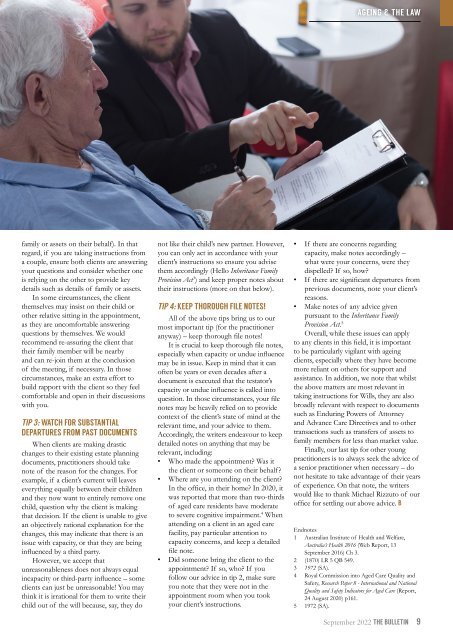LSB September 2022 LR
Create successful ePaper yourself
Turn your PDF publications into a flip-book with our unique Google optimized e-Paper software.
AGEING & THE LAW<br />
family or assets on their behalf). In that<br />
regard, if you are taking instructions from<br />
a couple, ensure both clients are answering<br />
your questions and consider whether one<br />
is relying on the other to provide key<br />
details such as details of family or assets.<br />
In some circumstances, the client<br />
themselves may insist on their child or<br />
other relative sitting in the appointment,<br />
as they are uncomfortable answering<br />
questions by themselves. We would<br />
recommend re-assuring the client that<br />
their family member will be nearby<br />
and can re-join them at the conclusion<br />
of the meeting, if necessary. In those<br />
circumstances, make an extra effort to<br />
build rapport with the client so they feel<br />
comfortable and open in their discussions<br />
with you.<br />
TIP 3: WATCH FOR SUBSTANTIAL<br />
DEPARTURES FROM PAST DOCUMENTS<br />
When clients are making drastic<br />
changes to their existing estate planning<br />
documents, practitioners should take<br />
note of the reason for the changes. For<br />
example, if a client’s current will leaves<br />
everything equally between their children<br />
and they now want to entirely remove one<br />
child, question why the client is making<br />
that decision. If the client is unable to give<br />
an objectively rational explanation for the<br />
changes, this may indicate that there is an<br />
issue with capacity, or that they are being<br />
influenced by a third party.<br />
However, we accept that<br />
unreasonableness does not always equal<br />
incapacity or third-party influence – some<br />
clients can just be unreasonable! You may<br />
think it is irrational for them to write their<br />
child out of the will because, say, they do<br />
not like their child’s new partner. However,<br />
you can only act in accordance with your<br />
client’s instructions so ensure you advise<br />
them accordingly (Hello Inheritance Family<br />
Provision Act 3 ) and keep proper notes about<br />
their instructions (more on that below).<br />
TIP 4: KEEP THOROUGH FILE NOTES!<br />
All of the above tips bring us to our<br />
most important tip (for the practitioner<br />
anyway) – keep thorough file notes!<br />
It is crucial to keep thorough file notes,<br />
especially when capacity or undue influence<br />
may be in issue. Keep in mind that it can<br />
often be years or even decades after a<br />
document is executed that the testator’s<br />
capacity or undue influence is called into<br />
question. In those circumstances, your file<br />
notes may be heavily relied on to provide<br />
context of the client’s state of mind at the<br />
relevant time, and your advice to them.<br />
Accordingly, the writers endeavour to keep<br />
detailed notes on anything that may be<br />
relevant, including:<br />
• Who made the appointment? Was it<br />
the client or someone on their behalf?<br />
• Where are you attending on the client?<br />
In the office, in their home? In 2020, it<br />
was reported that more than two-thirds<br />
of aged care residents have moderate<br />
to severe cognitive impairment. 4 When<br />
attending on a client in an aged care<br />
facility, pay particular attention to<br />
capacity concerns, and keep a detailed<br />
file note.<br />
• Did someone bring the client to the<br />
appointment? If so, who? If you<br />
follow our advice in tip 2, make sure<br />
you note that they were not in the<br />
appointment room when you took<br />
your client’s instructions.<br />
• If there are concerns regarding<br />
capacity, make notes accordingly –<br />
what were your concerns, were they<br />
dispelled? If so, how?<br />
• If there are significant departures from<br />
previous documents, note your client’s<br />
reasons.<br />
• Make notes of any advice given<br />
pursuant to the Inheritance Family<br />
Provision Act. 5<br />
Overall, while these issues can apply<br />
to any clients in this field, it is important<br />
to be particularly vigilant with ageing<br />
clients, especially where they have become<br />
more reliant on others for support and<br />
assistance. In addition, we note that whilst<br />
the above matters are most relevant in<br />
taking instructions for Wills, they are also<br />
broadly relevant with respect to documents<br />
such as Enduring Powers of Attorney<br />
and Advance Care Directives and to other<br />
transactions such as transfers of assets to<br />
family members for less than market value.<br />
Finally, our last tip for other young<br />
practitioners is to always seek the advice of<br />
a senior practitioner when necessary – do<br />
not hesitate to take advantage of their years<br />
of experience. On that note, the writers<br />
would like to thank Michael Rizzuto of our<br />
office for settling our above advice. B<br />
Endnotes<br />
1 Australian Institute of Health and Welfare,<br />
Australia’s Health 2016 (Web Report, 13<br />
<strong>September</strong> 2016) Ch 3.<br />
2 (1870) <strong>LR</strong> 5 QB 549.<br />
3 1972 (SA).<br />
4 Royal Commission into Aged Care Quality and<br />
Safety, Research Paper 8 - International and National<br />
Quality and Safety Indicators for Aged Care (Report,<br />
24 August 2020) p161.<br />
5 1972 (SA).<br />
<strong>September</strong> <strong>2022</strong> THE BULLETIN 9


















